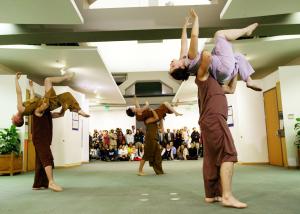Issue Date: December 26, 2003
Diversity as a doorway to the divine By MICHELLE A. GONZALEZ Shame, violence and torture demand not only compassion but solidarity and action. That was one of many messages heard at a weeklong festival held at Loyola Marymount University in Los Angeles Oct. 26-Nov. 2. “The Color of God: Culture, Spirituality and Justice” brought together scholars, activists, artists, poets, filmmakers, dancers, musicians and pastoral leaders to examine how culture, ethnicity and race shape our understanding of justice, truth and spirituality. The many hues of God were expressed via dance, art shows, poetry reading and a dizzying array of lectures. The voices of four of the conference participants appear below. Speaking truth to power Sr. Dianna Ortiz, an Ursuline nun, was abducted and tortured in 1989 in Guatemala. She is currently a human rights activist who speaks internationally on torture, is director of the Torture Abolition and Survivors Support Coalition International, and has written a book titled The Blindfold’s Eye: My Journey from Torture to Truth (Orbis Books, 2002).
Speaking less than a week before the 14th anniversary of her torture, Ortiz gave a moving presentation, titled “From Torture to Truth,” on her experience of torture and its aftermath. A single candle burned next to her, a reminder of all who have been tortured and are being tortured across the globe. She asked conference participants to pray for the tortured and for the conversion of the instigators of torture. Ortiz arrived in Guatemala in 1987, where she taught Mayan children. Despite numerous death threats, Ortiz remained in San Miguel, for she had found her calling and ministry among the Mayan people. On Nov. 2, 1989, she was abducted and tortured by Guatemalan security forces whose boss was American. For 24 hours she was kept in a clandestine prison, burned more than 111 times, gang raped, and was forced to participate in the torture of another human being. “Your God is dead,” one of her torturers whispered in her ear. During the ordeal, Ortiz confessed, “With God I too had died and my trust in the human family.” Her ministry of teaching was taken away, but a new ministry was born, a ministry that chose her. She remains “shackled to the promise” to tell the stories of the tortured voiceless. “Torture fractured and dismantled my faith,” Ortiz reported, and she said that her image of a gentle, passive God died in that prison. Still, in the face of her deepest despair, her faith strengthened. She found an image of God in the brokenness of those who have been tortured. Faith demands action, Ortiz asserted, and called listeners to speak truth to power. Ortiz reminded conference participants that over 150 countries are currently practicing torture, including the United States. She added that according to the Center for Justice and Accountability, between 1,000 and 10,000 torturers live in the United States. Ortiz concluded by linking torture to the crucifix, reminding Christians that “ours is the only religion founded by a victim of torture.” A Mexican image of God Orlando Espín offered a theological reflection grounded in the faith of U.S. Latinos and Latinas, who, though a large percentage of the U.S. Catholic public, are underrepresented in ecclesial structures and academia. His presentation, titled “Guadalupe and the Holy Spirit: A Mexican image of God?” explored the possibility of the patron saint of the Americas, Our Lady of Guadalupe, as a Mexican and Mexican-American image of the Holy Spirit. Espín is associate professor of theological and religious studies at the University of San Diego, director of the Center for the Study of Latino/a Catholicism at the university and founding editor of the Journal of Hispanic/Latino Theology. He emphasized the contextual nature of all theological reflection. Theology, Espín said, is always cultural and historical. Any attempt to de-culturalize the theological and religious expressions of a community is dehumanizing and, thus, sinful. Espín highlighted the primary place of popular religion as a place of Hispanic self-disclosure. “Popular” does not refer to “widespread,” but instead to the religious practices that emerge from the people themselves. Popular religion carries the wounds of Hispanic marginalization. Espín did not present a romanticized notion of popular religion but instead affirmed that as a reflection of Latin culture it shows who Hispanic people are, both good and bad. For Espín, who specializes in popular Catholicism as a theological source and in U.S. Latino and Latin American systematic theologies, popular religion is a way of being Catholic latinamente. Espín emphasized Our Lady of Guadalupe as a culturally specific and Christian image of God. Espín cited increasingly favorable arguments in asking whether Guadalupe is an authentic and doctrinally legitimate Mexican “representation” of the Holy Spirit. His purpose was not to state that Guadalupe is Mary and, thus, that Mary brings a feminine dimension to the divine. However, if Guadalupe is a representation of the Holy Spirit, then this legitimizes the divine as understood through feminine categories -- though we are always mindful of the limitations of human categories about God. The colonial legacy of Christianity Chung Hyun Kyung opened her presentation by inviting participants into a nonverbal reflection on God. She told them to close their eyes and breathe deeply, and led them through a guided imaging of God. Asking participants to picture God’s image, including race, gender, hair, clothing and age, Chung demonstrated in her exercise that everyone has a preconceived notion of God based on their context, history and religious background. Turning to the history of Asia, Chung emphasized the colonial legacy of Christianity and the imposition of a white Jesus on Asian peoples. Weaving together autobiography, history, politics and theology, she presented an image of God informed by concrete social justice and Asian spirituality.
A lay theologian of the Presbyterian Church of Korea, Kyung is associate professor of ecumenical theology at Union Theological Seminary in New York City and author of Struggling to Be the Sun Again: Introducing Asian Women’s Theology. Chung reminded participants of how complex it is for us to say anything authentic about God. However, the limitations of humanity should not silence our God-talk. Our understandings and expressions of God are a profound dimension of human experience. Like Espín, Chung emphasized the manner in which culture and context shape our religious expressions. She also affirmed the political nature of all theology. Marginalized peoples are always forced to learn and understand the dominant group’s theological perspectives. However, the dominant group is not obligated to learn the stories or listen to the voices of those at the margins. Messengers of hope Jesuit Fr. Gregory Boyle has dedicated the last 20 years of his life and ministry to those at the margins of the urban landscape of Los Angeles -- Latino youth. Boyle is founder and director of Jobs for a Future/Homeboy Industries, an employment referral center and economic development program for at-risk and gang-involved youth, located in the Boyle Heights area of Los Angeles. Over 1,000 gang members pass through his office every month. “Our image of God informs how we treat each other,” Boyle said. Ex-gang members (or “homies,” as he refers to them) will not be aware that God notices and loves them until we notice them, their daily struggles and the systemic poverty that keeps them in a cycle of gang life and violence. In his ministry and work, Boyle chooses to stand in solidarity with those who go unnoticed in this world, young men and women who have internalized self-hatred and no longer see their worth. “We are called to be messengers of hope; no one escapes the notice of God,” Boyle said, reminding participants, “Ours is a God who cannot take his eyes off of us.” Noting that the root of violence is shame, Boyle called participants to recognize the full humanity of all people, especially those at the margins of society, “homies” who have been written off by everyone else. Through Homeboy Industries’ job placement program, young men and women are able to find a sense of identity, worth and pride in themselves and their work. This philosophy is best summed up in the slogan of Homeboy Industries: “Nothing stops a bullet like a job.” Boyle concluded his presentation by inviting the assembly to allow our “hearts to be broken by that which breaks the heart of God.” Michelle A. Gonzalez, assistant professor of theological studies at Loyola Marymount University, is author of Sor Juana: Beauty and Justice in the Americas. National Catholic Reporter, December 26, 2003 |


